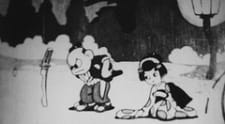Rate a 3
English Subtiled
No sound
Story
Not much of one, more simple if anything. In terms of introduction there was promise. Artwork conveyed a lovely display of romantic affection. The main character's main problem was discussed. Although, midway or for the most part of the film that is when the movie became rather confusing or dropped. At one point there is a person roaming the street with unfortunate news but the art and story seems to have ignored that complete and went with a side story where the action was the opposite. Then you have the evil character come into play. He hears of this unfortunate news
...
Alternative Titles
Japanese: 元禄恋模様 三吉とおさよ
More titlesInformation
Type:
Movie
Episodes:
1
Status:
Finished Airing
Aired:
Jun 23, 1934
Producers:
The National Film Center Japan
Licensors:
None found, add some
Studios:
None found, add some
Source:
Original
Duration:
8 min.
Rating:
G - All Ages
Statistics
Ranked:
#132312
2
based on the top anime page. Please note that 'Not yet aired' and 'R18+' titles are excluded.
Popularity:
#13843
Members:
1,050
Favorites:
1
Resources | Reviews
Filtered Results: 2 / 2
Sort
Your Feelings Categories Feb 13, 2021
The years of Genroku are generally considered to be the Golden Age of the Edo period. The previous hundred years of peace and seclusion in Japan had created relative economic stability. The arts and architecture flourished. In this setting, we come across Sankichi, a wandering vagabond who might have once been a samurai and his desire to impress the lady who thinks he is a coward for having (potentially) surviving despite the passing of his feudal lord.
I'm giving this a higher grade solely for how remarkably well it has been preserved in comparison to works of similar Japanese peerage, which makes it a good ... |


